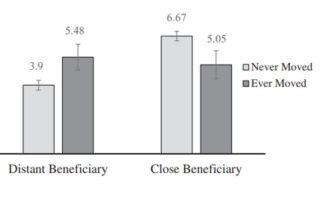Finding the Globalist Identity
Identities. We all have lots of them. Our personal identities are not statistical groupings with random variables available to create potpourri gibberish. But sadly, that’s the route most agencies go and while that approach is deceptively alluring it’s still baseless nonsense.
An Identity is something a person psychologically owns, a sense of self. The best way to know is to ask individuals if they identify this way or that way. This is called zero party data and it provides enormous competitive advantage. Lots of organizations collect this as a census during acquisition – hence they have this data for everyone in the newly acquired universe. And these new folks are always your biggest risk and pain point. But, knowing their Identity and tailoring accordingly – i.e. match message to person, not statistical probability – is one of the best ways to mitigate your risk and lower attrition pain.
Why not find these people in acquisition mail and divide that universe not by impenetrably useless RFM buckets but instead, by who they are? Send one mailing to Dog people, another to Cat people if you’re an animal charity. Why send one piece to all and risk alienating or not fully connecting with these two different people?
The rub has always been finding these people in a mass market way, a priori. This task is made all the more difficult when you have to come up with more abstract identities such as “Globalist” versus Parent, or Cat or Dog lover.
When it comes to finding special identities in in a mass market way, we’ve used lots of proxy data to pinpoint these groups. Globalists do tend to have some demographic profile skews but, like those hideous persona clusters, the skews are more wrong than right because of what they don’t measure.
However, we’ve discovered another proxy variable for finding our Globalists – those folks much more likely to give to international relief causes. The proxy? Residential mobility or the frequency of moving.
This behavior has often been associated with less stability and is frequently seen as a negative trait for lots of consumer work. However er, as it turns out, it’s a useful proxy for prosocial behavior, namely giving to beneficiaries who are physically distant – i.e. international aid.
People who move a lot change their sense of self as they change social landscapes and regularly adapt to new relationships. These folks also tend to have more of a ‘self’ versus a local, community focus but paradoxically they also tend to have a sense of connection to past communities. This fosters a sense of globalism, belonging to lots of places and seeing similarilties versus differences in people within a country or across nations.
In an analysis of Chinese donors living far away from the location of the Wenchuan earthquake, those who had moved within China donated almost twice as much as those who had never moved.
In a US experiment those who had “ever moved” were far more likely to support an international relief charity than the “never moved” group.

The analysis also showed that a direct, pure measure of Global Identity (we have these measures and use them routinely as part of the acquisition process in TM, F2F and online) trumps mobility, meaning not all Globalists have moved a lot. But, people who move a lot are more likely to have a Globalist mindset or be receptive to thinking about distant others differently.
All of this is more grist for the mill of fundraising in a way that finally matches what we all know to be true – people are different so we need to stop treating them the same.
Kevin



[…] Go to Source of this post Author Of this post: Roger and Kevin Title Of post: Finding the Globalist Identity Author Link: {authorlink} […]
Fascinating, as always, Kevin. “Expatriate” makes more sense now.
Thanks Jeff, yes, we’re glad to have come across this finding to add to the proxy variables we’ve been using to find some of these abstract Identities. The other bit I didn’t mention in the post is the value of messaging to the audience even when your targeting/aiming isn’t precise. I’d argue most copy is written to a generic shell of a donor. Even if you can’t aim precisely, aim imprecisely and write for a specific type of person – Globalist in this example.
Self-selection is a powerful thing and it occurs with every single response. We advocate writing for a specific someone – the Globalist (using the direct survey measures as theme guidance for messaging_ – and they’ll be the ones who disproportionately respond. They are also the ones who are most likely to keep giving. So, tag them in the CRM as “globalist” and continue treating them that way. Pragmatism reigns supreme.